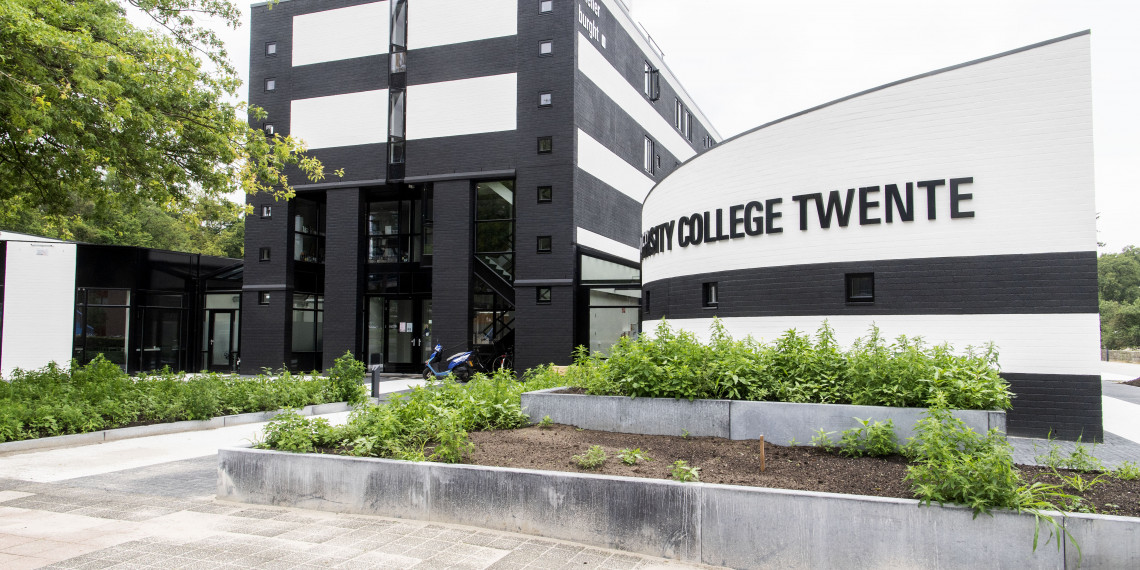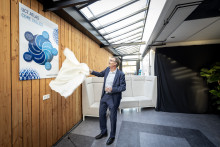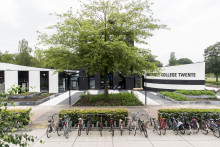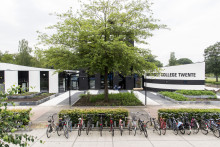Ronald Plasterk, who would later become Minister of Education, once described them in a column as ‘an expensive nursery for rich kids’. He was talking about University Colleges: a phenomenon that originated in the US and Great Britain and involves a strict selection of excellent students, higher tuition fees, living together on campus and an intensive, broad and interdisciplinary Bachelor’s programme with plenty of personal freedom of choice. This all falls under the banner of ‘Liberal Arts & Sciences’.
T for ‘Technology’
Before the turn of the millennium, University College Utrecht was the first in the Netherlands to offer this kind of programme for excellent students. Some 10 years later, Amsterdam University College followed suit. It was around that time that the UT became interested in setting up its own excellence programme. These plans remained on the back burner for a while, gradually becoming more concrete before being translated into strategic visions and policy documents and receiving approval from the University Council and the NVAO, the Dutch-Flemish organisation that monitors the quality of higher education.
By September 2013 – a year later than initially planned – the UT finally had its own University College. It was named ‘the Academy for Technology, Liberal Arts and Sciences’, or ATLAS for short. The T – which stands for ‘Technology’ – was supposed to serve as an important distinguishing factor that would set ATLAS apart from other Liberal Arts & Sciences programmes. After all, none of the University Colleges offered an engineering programme, said Kees Ruijter, initiator of the programme. That is, until the Twente University College was established, of course. Moreover, some considered ATLAS an ideal catalyst for educational innovation. In the words of the then rector Ed Brinksma, ATLAS would be ‘a unique programme with a distinctive profile’ and ‘a driving force for the rest of our education’.
Land of milk and honey
No, it should not be called an ‘elite programme’. But few would deny that the structure of ATLAS and its preconditions were both privileged and enviable. The crème de la crème of curious and inquisitive students, a close-knit teaching team with acclaimed lecturers, ample room for students to work on their personal development and ample room for lecturers to freely engage in didactic experimentation. And all of this was provided in a small-scale and almost hyper-personal setting; it is the dream of many a student and lecturer, especially in times of over-crowded universities. The University College became a land of milk and honey.
The fact that this approach was bearing fruit quickly became evident from the results of the Keuzegids assessments. Time and again, ATLAS was awarded the title of ‘top programme’. Even in the years immediately following the introduction of the Twente Education Model, when, according to Keuzegids, the UT was experiencing ‘a slump’, ATLAS was one of the few programmes that managed to stay on its feet.
Headaches and high accreditation
There were also a few headaches, on the other hand, particularly on the part of the University Council. ATLAS, which was soon renamed University College Twente, had essentially been struggling with low enrolment numbers since day one. Initially, the programme aimed for an inflow of at least 50 students, but in reality, not even 30 students enrolled. These concerns about enrolment numbers persisted in the years that followed. Even in 2020, the enrolment numbers were still considered ‘worrying’. The University College needed to work on a new business case, the Executive Board decided. And the University Council, in turn, repeatedly stressed the cost of the programme, especially when compared to the regular Bachelor’s programmes at the UT. The cost of ATLAS should not exceed the cost of a regular Bachelor’s programme by more than 500,000 euros.
Partly to get the financial situation straight, University College Twente was incorporated into the ITC faculty. Things were still looking up for the programme then, as evidenced by a 2019 NVAO accreditation report. The assessment panel was positive across the board and praised the Twente University College for its ‘unique combination of science/engineering and social science’, ‘the dedication of its well-qualified and very motivated staff’ and ‘the significant added value of the programme, especially in terms of the self-directed reflective approach and confidence with which alumni are able to continue their career’.
As icing on the cake, University College Twente was awarded the special feature ‘Small-scale and intensive education’ by the NVAO. Indeed, it is not inconceivable that the persistent inflow problem might have made a positive contribution to this. After all, high-quality small-scale and intensive education is easier to achieve with just thirty students a year, instead of three hundred.
Unsafe culture
If ATLAS was doing so well, why did it receive a rather scathing evaluation report in 2022? The interviews conducted by evaluator Margot Kok reveal a range of different problems. Some of them are on a more abstract level and cannot be solved overnight. Take, for example, the positioning of the programme: although the University College is now part of the ITC faculty, other faculties should still feel a sense of responsibility. That turned out not to be the case.
And despite all efforts, the University College failed to find a proper place for itself within the ITC faculty. This was mainly due to a shifting and therefore unclear division of roles and a lack of communication. The new and inexperienced management team did not receive the required guidance from the Faculty Board. One striking example given in the report: the Faculty Board wanted to provide meticulous guidance to the University College Management Team. An external agency was supposed to provide a management game, but apparently, that method was not supported by the members of the ATLAS Management Team, who, partly due to Covid-19, were hardly able to meet in person. In short: the required guidance practically came to a standstill.
And so it happened that the problems that had started on an innocuous abstract level began to turn in to a maelstrom of organisational issues: discrepancies in experience levels of the Management Team, subsequent imbalance and friction, a lack of cooperation and too many difficult and coordinating tasks for young and inexperienced staff members. This maelstrom proved even more devastating when it came to the culture, which the report described as ‘unsafe at all levels’. It goes on to say that ‘the scale of the troubles is so high that employees are hindered in their work and life’. And: ‘Some flee into discussions about mandates and agreements, some get sick, some argue, some gossip, some leave, some continue to muddle through. In all cases, interviewees say the students is what makes them go on’.
Murphy’s Law
And if that were not enough, the Covid-19 crisis was here to continue the University College’s affliction under Murphy’s Law. It was not just the Management Team that suffered. It goes without saying that the entire University College was deeply affected – especially the students. Incidentally, ATLAS also needed to find its place within another faculty and within the renovated Drienerburght building. Because of the small size and close community of the programme, the common dissonance that comes with the Covid-19 crisis – the distance, the difficulties of digital education, all the noise and the initial chaos of 2020 – was a harder blow to ATLAS than to the average study programme.
Nevertheless, a group of nine (former) students made a passionate plea outlining all the good aspects of the University College: the community spirit, the students’ freedom and control, the commitment of the lecturers... These things had supposedly not been affected by the organisational difficulties. However, the assessment in the most recent Keuzegids shows an entirely different picture. Although seven out of eleven Dutch University Colleges are awarded the title of ‘top-rated programme’, the Twente study programme was at the bottom of the list with only 60 points, even though it had been considered a top programme the year before. Rector Tom Veldkamp’s observation in his response to the evaluation report seems to be more accurate in this case: ‘This is a relatively small and close community, if something doesn’t go well, it quickly affects the entire community’. Besides, as noble as it is that the students are standing up for their lecturers, the report shows that the lecturers were going the extra mile despite the circumstances, not because of them.
Motionless
The report also draws a rather wry conclusion which includes elements that cannot be exclusively attributed to the more pragmatic organisational problems. Somewhere over the past nine years, a difference in vision has emerged with regard to the University College. The Executive Board wants an intake of 75 to 150 students per year, says that ATLAS should be a testing ground for education which it can profile itself with and calls for support from the entire university. ITC’s Faculty Board is willing to help, but not in a directing role. Meanwhile, members of the Management Team are mainly working on their own, as little islands. And whereas the ATLAS core team wants to stick to the old principles, the young lecturers would like to further develop the excellence programme in close cooperation with students. In summary: all the stakeholders want to take the University College in their own specific direction. But if you try to pull something in too many different directions, you end up drifting motionlessly in the middle.
So what happens now? Getting everyone to agree on a certain vision was the first – justified – conclusion. Like a Lilianne Ploumen avant la lettre, Dean Mieke Boon decided to take a step back; according to her, a different kind of expertise is needed to solve the problems at ATLAS. It is now up to Heleen Miedema, a seasoned professional in the Health domain, to pick up the pieces or to simply polish things up – depending on the situation she encounters.
In limbo
Exactly how superficial or deep-rooted, surmountable or insurmountable the problems are, remains to be seen. The section of the report devoted to the unsafe culture certainly puts matters in perspective. Another thing that clearly emerges from the report is that, even after nine years, the UT has still not succeeded in providing its University College with a proper home. Not just in a physical sense, but also with regard to its position within the organisation. There needs to be clarity about the objectives in terms of intake, finances and the direction of the programme, what type of students the University College should ‘produce’, where and how ATLAS fits in best within the UT, and above all: who takes ownership. ATLAS cannot remain stuck in limbo, where it sort of belongs to everyone and thus, to no one.
Moreover, despite the pervasive problems, the breeding ground of the programme remains extremely fertile. If you read between the lines of the evaluation report, you can see that the stakeholders’ enthusiasm has not been completely extinguished. It is clear to see that ATLAS students and alumni are committed, driven and eager to learn, and they move on to prestigious institutions such as Cambridge and ETH Zurich. University College Twente still has the potential to be the UT’s pride and joy, as it should have been all along.







